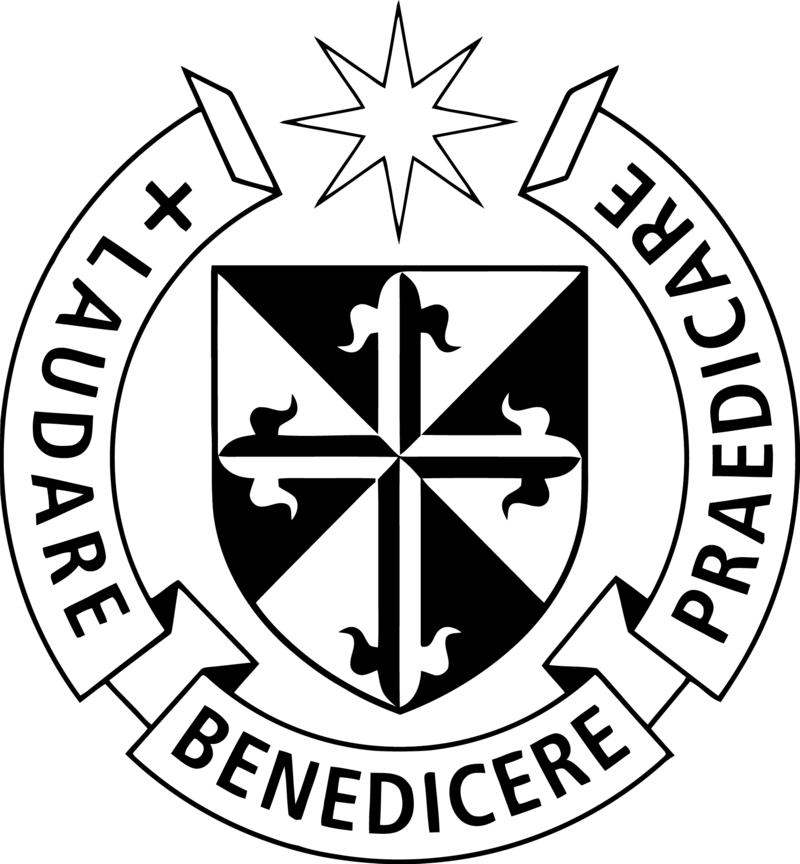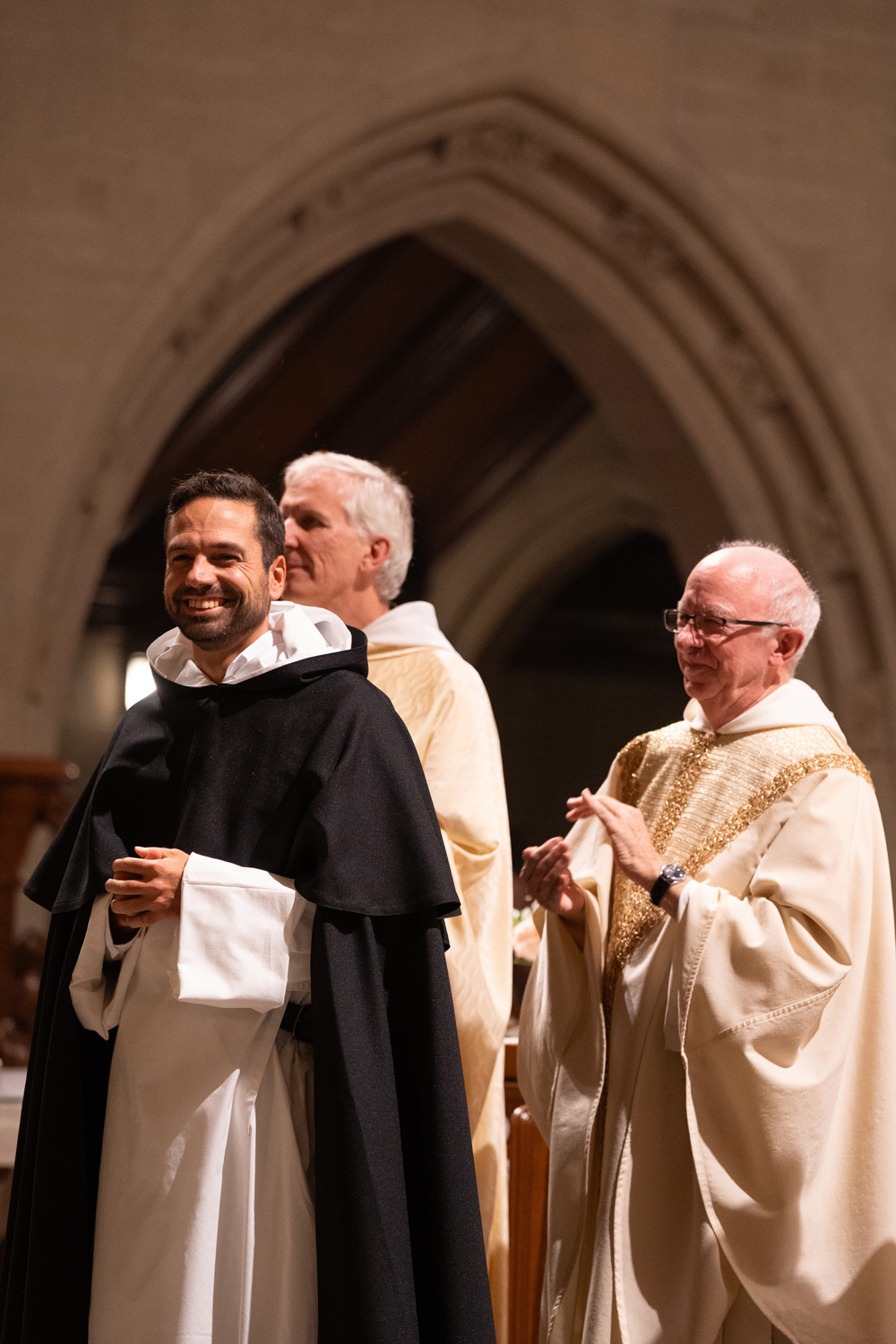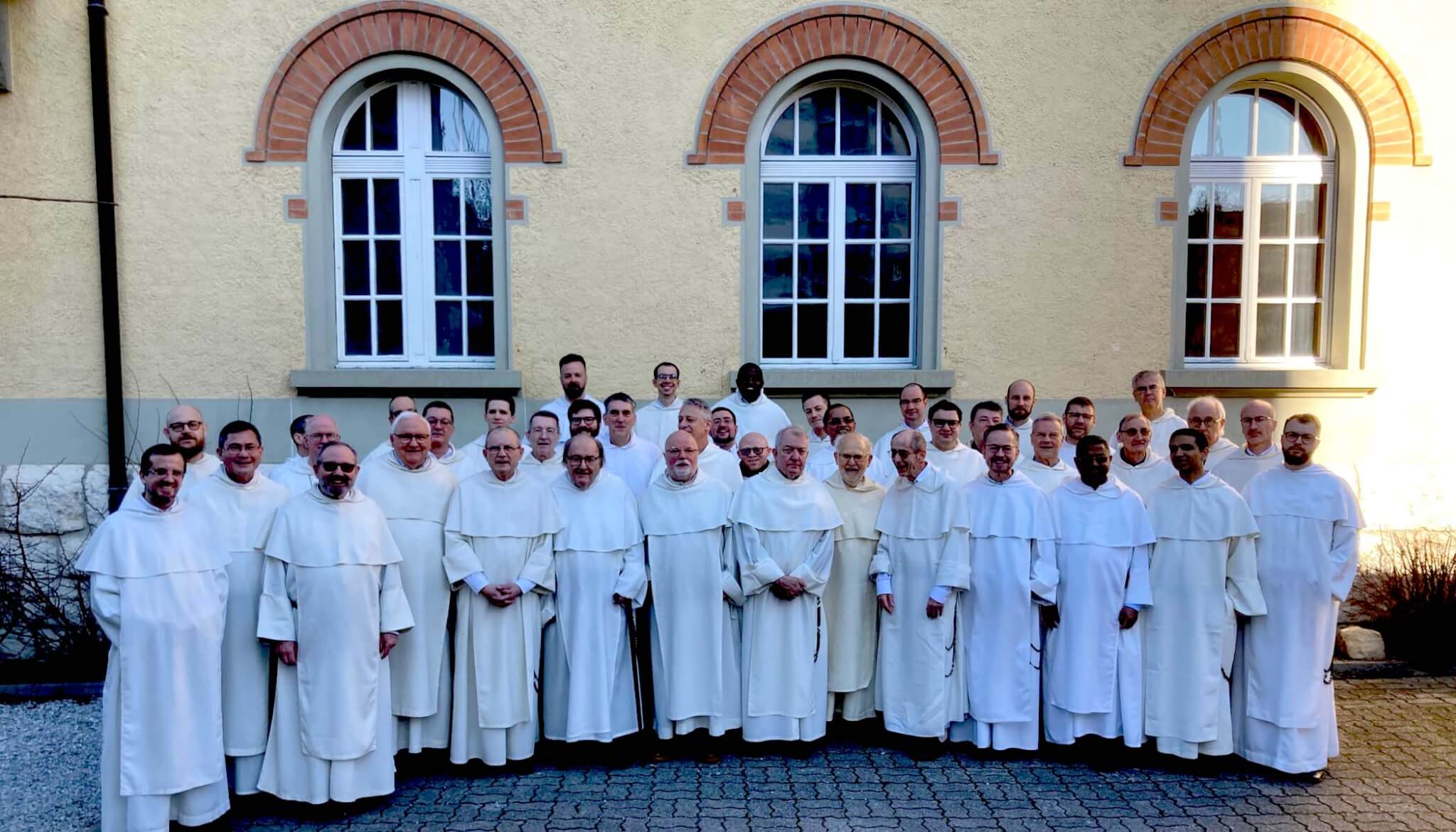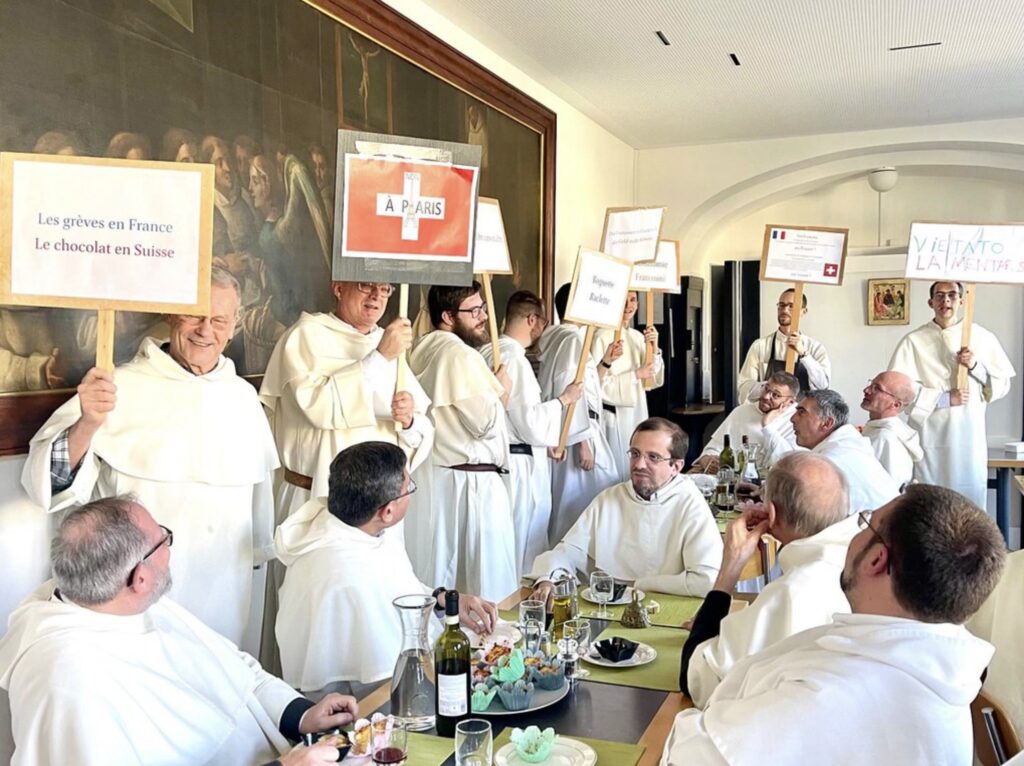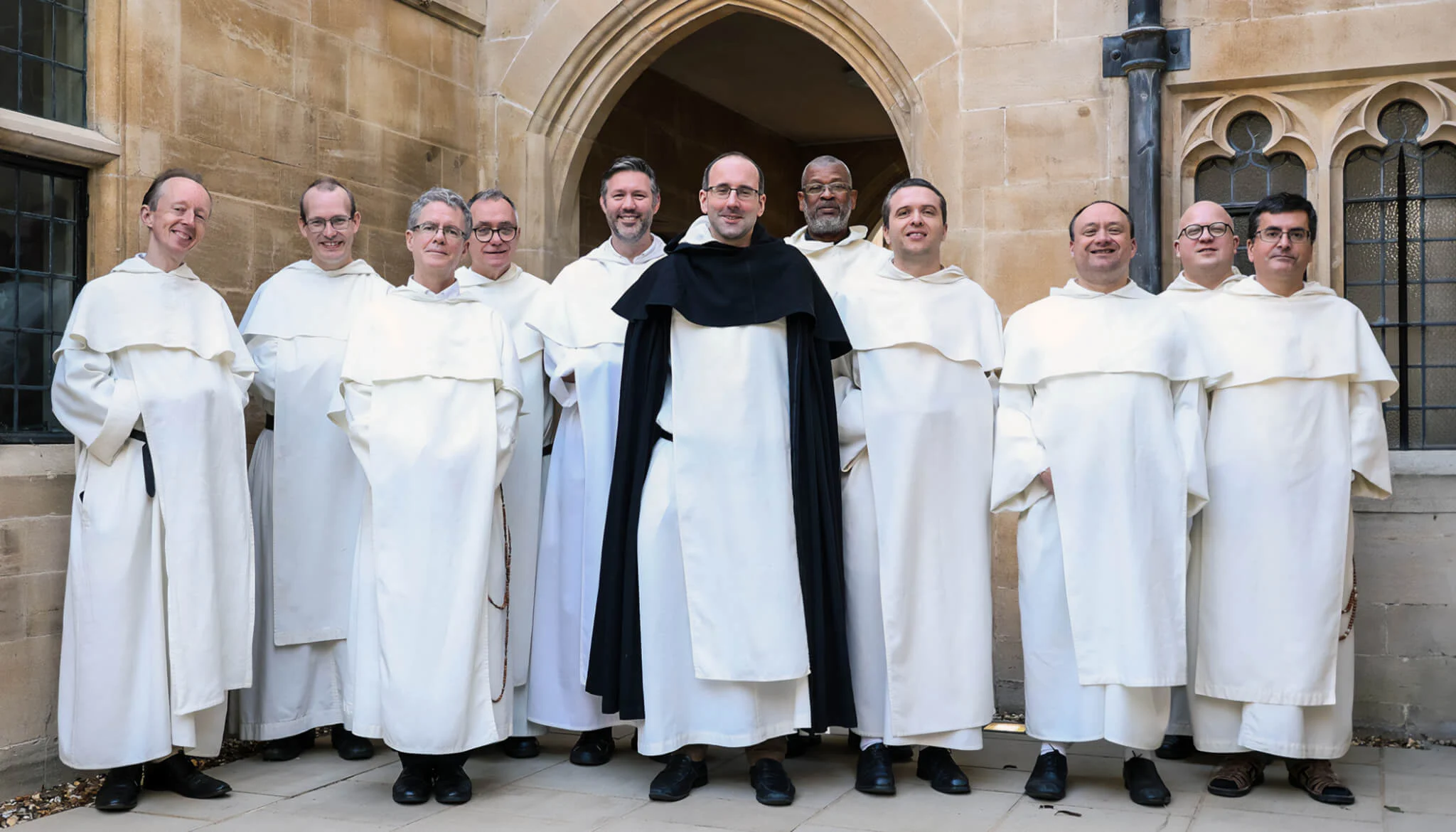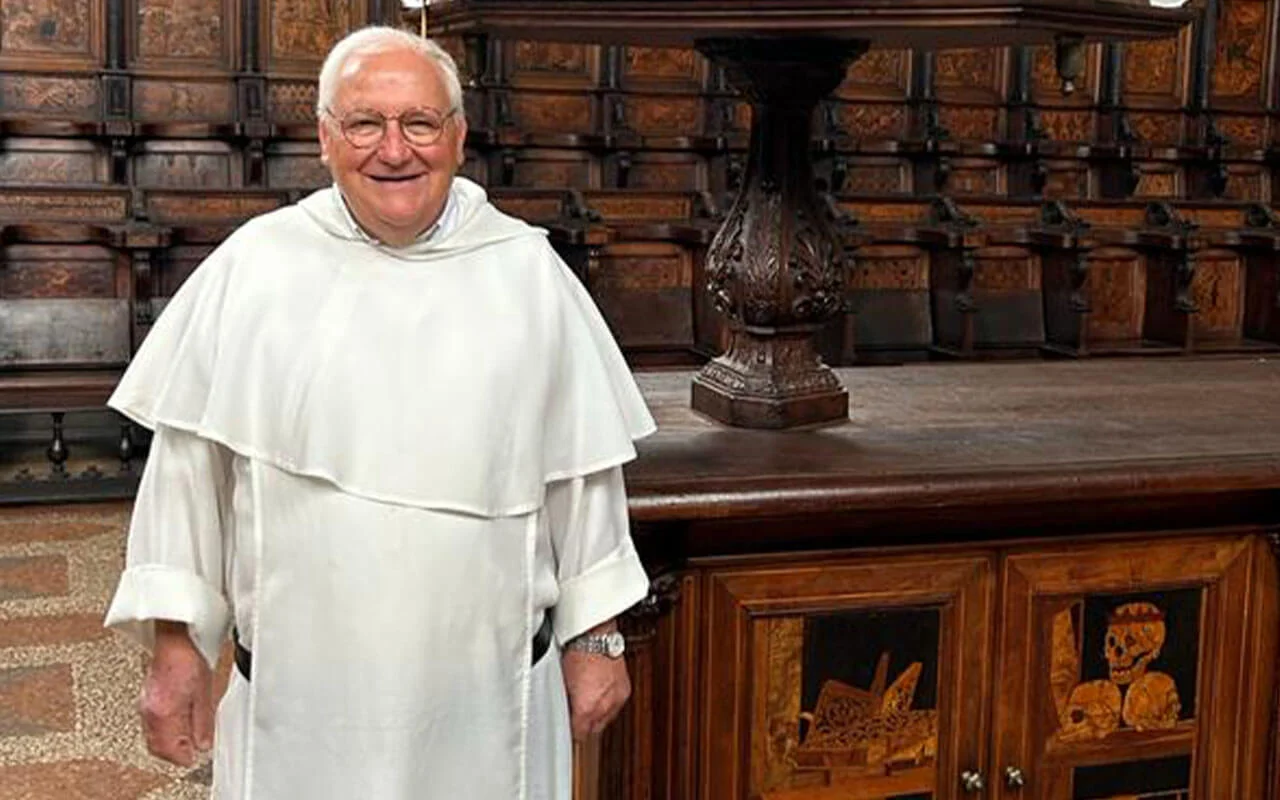On August 31, 2024, Brother Simon Lessard made his first vows as a Dominican for the Province of St. Dominic in Canada. He is originally from Quebec City, and is currently “responsible for partnerships” at Magazine Le Verbe, a magazine that aims to ” to bear witness to Christian hope in the media by combining Catholic faith and contemporary culture. ” Congratulations to Brother Simon Lessard.
Homily given by the Prior Provincial on the occasion of the profession of Brother Simon Lessard, o.p.
Dear Simon, in choosing this Gospel, Jesus asks Peter: “Simon, son of John, do you love me? It’s clear to me that this is the heart of your profession of faith, and that you make Simon Peter’s heartfelt cry your own: “You know, Lord, that I love you”. And that you are ready to go wherever he leads you, following in the footsteps of Saint Dominic, whom you have chosen as your road companion.
To fully understand what lies at the heart of Dominican life, we need to contemplate both the Order’s mission and its history, never losing sight of St. Dominic’s apostolic action in the light of his life as recounted by his brothers and sisters. The study of our history and our missions is essential, for Dominic left us no writings other than the first Constitutions of the Order, which he profoundly influenced, and which thus help us to better grasp the zeal that animated him. It was Father Vicaire, a great historian of the Order in the 20th century, who said:
“There are saints, such as Francis of Assisi, whose faces are accessible to all because they appear in so many stories that are as clear and colorful as illuminations. There are others, like Dominic, who are somehow hidden in… the light of his work, which in a way acts as a screen. [1]This is the first time that we have ever heard of a ” missionary intuition” from our founder, but which nevertheless speaks to us of his great missionary intuition, which is boundless, outside the narrow confines of the territory of an abbey church, a canon’s priory or even a diocese.
St Dominic was above all a man of the Church, and a rereading of his missionary action only makes sense from this perspective, where Dominic wants to save the Church of Christ from the schisms and heresies that threaten all around her. For Dominic, the world to be saved and the future of the Church are one and the same. This was to profoundly mark the identity of the Order and of all those who would follow in Dominic’s footsteps.
We of the family of Saint Dominic are of the Church, a Church that must constantly convert itself while making itself the servant of all, and this breath that animates our being together is above all apostolic. Dominican life is lived first and foremost in a mission that is defined and recognized by the Church as an extension of that of the Apostles and, by the same token, of Christ. It’s a life that plunges us into the heart of the Church’s mission, because that was the place of Dominic’s passion. Our Dominican life is shaped and forever marked by the compassion that dwelt in Dominic, and that made him moan and weep at night as he prayed: “My God, what will become of sinners?
Our Dominican life is therefore one of urgency for the world, because the good news of Jesus Christ is misunderstood and God’s love is often scorned. This is what makes Dominic’s steps so lively and cheerful, as well as those of all those who live the Gospel in his own way.
That’s why our Dominican life is one in which God must be our all, and concern for our neighbor the heart of all our commitments. This is why we are called to walk with Dominic on the road of itinerancy, “speaking of God or with God”, accepting to go wherever the mission leads us in discernment with our brothers. Our Dominican life does not turn us into monks, but at the same time it is nourished by study, prayer, silence and contemplation, while being supported by a community of brothers that assumes and carries the preaching and mission of each of its members. Dominican life gives us great freedom of action, while at the same time calling us to a profound life of interiority and fraternal relationships.
This life appeals to our freedom in Christ. It doesn’t lock us into narrow frames. It opens us up to creativity, responsibility and the open sea for the good of the mission. The Benedictine Mathieu de Paris, in the 13th century, was indignant when he saw the first Dominicans leaving their convents to go and preach the Gospel on the roads, something quite unheard of in their day. Mathieu de Paris said of the Dominican friars: “They have the universe for a cloister and the ocean for a fence!” And that’s our pride!
That’s why this freedom of ours also implies great trust in others, in the brothers and sisters with whom we journey. “What do you ask for?” asks the Prior Provincial when a brother makes his profession: “God’s mercy and yours,” replies the professed brother. Think of Dominic, who agreed to give pocket money to a brother who refused to leave without money, as he had asked him to do. There’s no authoritarianism here, despite the shifts of certain eras. Trust and fraternal mercy prevail over the law.
And this is a dimension of our Order that has always struck me. Many times I have heard Christians tell me that they have always loved going to confession with the Dominicans because of the fraternal, non-judgmental welcome they found there.
This attitude is very revealing of the fruitful ministry of many of our brothers, for Dominican life implies a positive vision of man and the world, a vision open to God’s grace and mercy, an unfeigned love for every man and woman encountered on the path of mission. Think of Dominique spending the night talking with a Cathar innkeeper. There is certainly no contempt or rejection of the other in Dominic’s attitude when he finds himself with a heretic. Quite the contrary, in fact. His only concern is to save his brother, and in this sense our mission is one of dialogue with the other and with the world.
Simon, eight hundred years ago, Dominic de Guzman, contemplating the distant horizons of Osma and Caleruega where he lived in Spain as a canon, heard the Lord’s call to the distant steppes where those who knew nothing of the good news of Jesus Christ lived, and who were called Cumans. It is this same call that still resonates today for you and for all those who take inspiration from this young Castilian canon, called with him to stand on the frontiers of the great challenges of our world. And if we Dominicans have pitched our tent in Dominic’s garden, it’s because we share a spiritual filiation with his charism as herald of the Good News of Jesus Christ, as well as his ardent compassion for the world. May your commitment to the Order of Preachers through the promise of your vows, dear Simon, give you the grace to continue deepening your call to follow Christ in the manner of Saint Dominic. If you give yourself entirely to it, you’ll find the greatest happiness of all. Jesus Christ’s promise!
Fr. Yves Bériault, o.p. Prior Provincial
[1] Preface to Guy Bedouelle’s book Dominique ou la grâce de la parole. Fayard-Mame, 1982. p.7.
